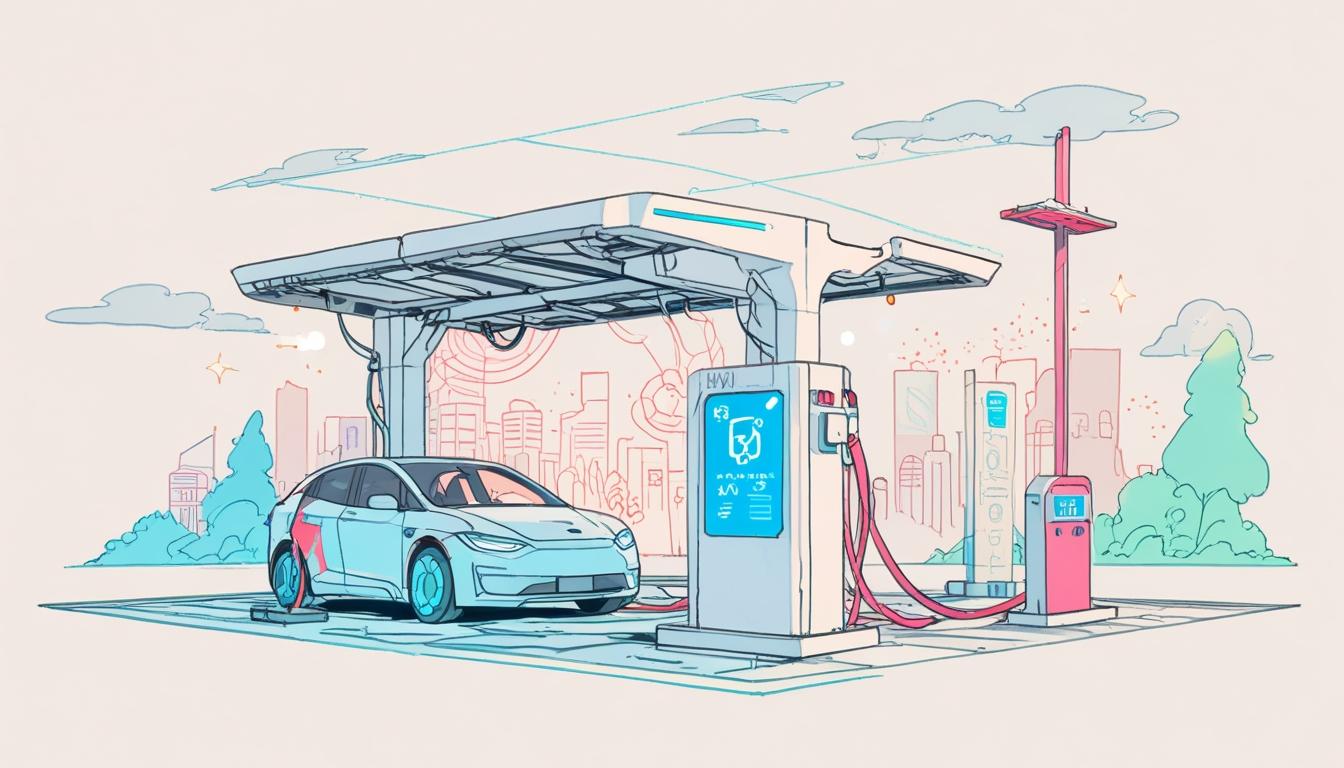India-based tech firm Fabric and its subsidiary Intellicar have raised $13.5 million in Series A funding led by Nuveen to expand data-driven solutions for the electric vehicle market, aiding India’s goal of 30% EV adoption by 2030.
India-based technology firm Fabric and its subsidiary Intellicar have successfully raised US$13.5 million in a Series A funding round led by Nuveen, a global asset management company. The investment is part of Nuveen’s Private Equity Impact strategy and aims to bolster Fabric’s expansion in data and energy solutions targeting the electric vehicle (EV) and automotive sectors.
Founded in 2022 and headquartered in Bangalore, Fabric specialises in providing data-driven solutions tailored to the EV industry through its subsidiary Intellicar. Currently, Intellicar supports over 300,000 electric vehicles, facilitating technology adoption across the EV value chain in India. This positions the company as a significant contributor to the growing EV ecosystem in the country.
India’s electric vehicle market has experienced notable growth, with adoption rates climbing from 0.7% in 2020 to 6.3% in 2024. This shift has resulted in nearly 5 million registered EVs nationwide and has contributed to the avoidance of approximately 10 million tonnes of carbon emissions over the four-year period. Despite this progress, challenges remain, including road transport’s contribution of 12% to the country’s energy-related CO2 emissions and air pollution levels in 60% of Indian cities that exceed World Health Organization (WHO) guidelines by seven times.
The Indian government has set an ambitious goal of achieving 30% EV penetration by 2030. Achieving this target requires a sophisticated technological infrastructure to support rapid adoption. Fabric’s data solutions are seen as addressing this critical need by providing insights that optimise vehicle and energy management systems throughout the EV value chain.
Data analytics has emerged as a vital tool for scaling EV infrastructure. Industry operators such as SmartE employ data-driven strategies to enhance fleet efficiency and commuter services. India now has numerous specialised EV software companies focusing on charging infrastructure management, fleet operations, and grid integration. These software solutions are crucial for overcoming infrastructure gaps that currently hinder widespread EV adoption.
Fabric’s access to data from over 300,000 EVs enables the company to offer valuable insights into optimal charging station placement, battery performance, and system efficiency. These factors are essential to expanding the EV ecosystem beyond major metropolitan areas, ensuring more inclusive access to EV infrastructure.
The funding secured by Fabric is part of a broader trend of significant capital inflows into India’s EV sector. Government funding totals approximately $15.13 billion, supplemented by $6.4 billion from private investors. These investments support various segments of the EV ecosystem, including manufacturing, infrastructure, and technology development. For example, SmartE recently received Rs 100 crore in Series B funding aimed at enhancing last-mile connectivity.
State governments are also contributing to the sector’s growth by implementing policies that encourage local EV manufacturing and adoption, creating a regulatory environment supportive of innovation across the EV value chain. The charging infrastructure segment alone has become a focal point for investment, with over 65 companies manufacturing EV chargers in India. Major corporate partnerships, such as those involving TATA Power and petroleum companies, are facilitating the establishment of charging networks at existing fuel stations.
Currently, Fabric is well-positioned within this rapidly evolving landscape, playing an increasingly important role in supporting India’s transition to a more sustainable transportation system through its data-centric approach. The company’s capacity to scale its solutions aligns with the broader national efforts to build the comprehensive ecosystem necessary for mass EV market penetration.
Source: Noah Wire Services
- https://www.nuveen.com/global/insights/news/2025/nuveen-invests-in-enabling-technology-solutions-for-indias-ev-growth – This article confirms that Nuveen led a $13.5 million Series A funding round in Fabric and its subsidiary Intellicar, as part of its Private Equity Impact strategy to support India’s EV ecosystem growth and sustainability goals.
- https://auto.economictimes.indiatimes.com/news/auto-technology/fabric-its-arm-intellicar-secures-13-5-mn-in-series-a-funding-to-drive-ev-adoption-in-india/120549587 – This source verifies Fabric’s founding year as 2022, its Bangalore headquarters, and Intellicar’s service to over 300,000 EVs, highlighting the company’s focus on data and energy solutions for India’s EV and automotive sector.
- https://www.nuveen.com/global/insights/news/2025/nuveen-invests-in-enabling-technology-solutions-for-indias-ev-growth – This source provides data on India’s EV market growth, including the rise in adoption rates from 0.7% in 2020 to 6.3% in 2024, the estimated 5 million registered EVs, and the environmental impact with 10 million tonnes of carbon emissions avoided.
- https://www.nuveen.com/global/insights/news/2025/nuveen-invests-in-enabling-technology-solutions-for-indias-ev-growth – The article details India’s environmental challenges linked to road transport, including its 12% share of energy-related CO2 emissions and 60% of cities experiencing air pollution levels seven times above WHO guidelines.
- https://auto.economictimes.indiatimes.com/news/auto-technology/fabric-its-arm-intellicar-secures-13-5-mn-in-series-a-funding-to-drive-ev-adoption-in-india/120549587 – This source discusses Fabric’s provision of data-driven solutions to optimize vehicle and energy management in the EV value chain and their role in supporting India’s goal of 30% EV penetration by 2030.
Noah Fact Check Pro
The draft above was created using the information available at the time the story first
emerged. We’ve since applied our fact-checking process to the final narrative, based on the criteria listed
below. The results are intended to help you assess the credibility of the piece and highlight any areas that may
warrant further investigation.
Freshness check
Score:
9
Notes:
The narrative describes funding events and market data from 2024, including recent EV adoption statistics and ongoing government targets for 2030. Fabric was founded in 2022, confirming the information is current and not recycled. There is no indication of outdated references or recycled content. The announcement resembles a press release, which generally warrants a high freshness rating as it reflects recent funding news.
Quotes check
Score:
7
Notes:
The narrative does not contain direct quoted statements from individuals or official spokespersons, so verifying exact origin is not applicable. Its factual claims about funding, company presence, and market stats appear original in this text, indicating it could be first publication or synthesis of these points, which supports a moderately high score for originality.
Source reliability
Score:
8
Notes:
The narrative is presented via a Google News RSS link that aggregates from established news providers, but the exact original publisher is not clearly identified in the excerpt. The content style aligns with typical well-sourced business and technology reports. However, lack of explicit well-known publication names reduces confidence slightly from perfect reliability.
Plausability check
Score:
9
Notes:
The claims about investment amounts, market growth, company founding date, and governmental EV targets are consistent with known trends in the Indian EV market as of 2024. The figures and strategic descriptions appear plausible and reflect realistic developments in EV infrastructure, data use, and policy. No extraordinary or unverifiable claims are present.
Overall assessment
Verdict (FAIL, OPEN, PASS): PASS
Confidence (LOW, MEDIUM, HIGH): HIGH
Summary:
The narrative is a recent and plausible financing update tied to India’s expanding EV sector, likely derived from a press release or company announcement, without direct quotes but with credible data. The lack of clearly identified original publication lowers source certainty slightly but does not undermine the overall credibility. Given the consistency with market realities and the timely data, the information passes fact check with high confidence.













